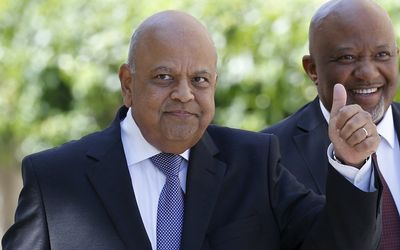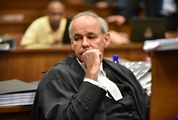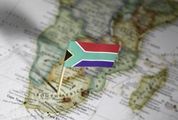THE only thing that is clear through all the dust being kicked up in our political arena is that the African National Congress (ANC) is entering this critical election year locked in a state of civil war. The principal combatants are President Jacob Zuma and newly reappointed Finance Minister Pravin Gordhan.
But they are really proxies for the beneficiaries of the patronage system Zuma has established in his administration and those supporting Gordhan’s efforts to get SA’s failing economy back on track.
Despite efforts to pretend all is well between the two principals, their mutual hostility is palpable. First, Zuma threw a punch at Gordhan, describing the unknown Des van Rooyen as the best-qualified minister he had ever appointed, then Gordhan responded by paying tribute to Nhlanhla Nene, whom Zuma had fired in favour of Van Rooyen, to loud applause from parliamentarians. It was pointed stuff.
They are like two raging bulls in the same kraal, pawing the ground and snorting at one another. The trouble is it is the economy that is likely to get hurt as the rating agencies look on and ponder whether to hold off any longer before consigning us to the economic junk heap.
Equally serious is that, as this struggle continues to delay more vigorous efforts to increase economic growth and cut national expenditure, our unemployment rate is going to balloon beyond the point of no return in the next two or three years — or as long as Zuma remains Number One.
When the ANC adopted the National Development Plan just over two years ago, the calculation was that SA needed to maintain an economic growth rate above 5% to begin reducing unemployment (now standing at 35%). But we have fallen so far short that the International Monetary Fund now reckons we need to maintain a growth rate of 7% a year.
Not even Gordhan, for all his courage in the face of the pro-Zuma gang, can see us achieving that. His budget aims at getting growth up to 2.8% by 2018, by which time the required growth rate will have risen to something like 10%.
And if Gordhan loses out in this scrap, even that will go out of the window.
So the stakes are high, since ballooning unemployment can lead only to more social instability and racial polarisation.
All this makes it clear that the national interest requires that Zuma be removed from the presidency as soon as possible. This can be achieved only if the electorate delivers such a shock to the ANC in this year’s local government elections that the party leadership realises it can no longer afford him.
Which is why I keep saying that these elections, although only at municipal level, are the most important since we brought Nelson Mandela to power in 1994.
Let me clear away some of the dust by outlining the disposition of forces in this critical struggle. It has been simmering for some time, but it rose to its current intensity when Nene, as finance minister, vetoed a deal the chairwoman of the South African Airways board, Dudu Myeni (said to be Zuma’s intimate friend), had cut with a private operator. There have been reports the operator concerned was part of the Gupta family, but I have not been able to confirm that. Whoever it was, Zuma was apparently enraged by the veto and fired Nene.
Thus Nenegate, which caused the rand to nosedive and wiped billions off our markets overnight. Writing in his Business Day column, Peter Bruce has done some smart arithmetic to show that Zuma’s blunder is costing the country R30.8m a day.
But none of this seems to have deterred the pro-Zuma contingent in the ANC. They have long been doing their damndest to discredit Gordhan by having the National Prosecuting Authority, which is under Zuma’s thumb, charge him with forming a "rogue spy unit" within the South African Revenue Service (SARS). There have been hints that the alleged unit was spying on Zuma and other patronage benefactors to see whether they were paying taxes on their ill-gotten gains. Whether Zuma himself was aware of this campaign remains unclear, but what we do know is that he moved Gordhan out of that portfolio and appointed a loyalist, Tom Moyane, to take charge of SARS within the Treasury.
Since then, Moyane has been removing Gordhan’s allies from SARS in line with a commissioned report whose members never questioned Gordhan or any of the removed SARS people.
Since his return to the Treasury, Gordhan has protested to Zuma that he can’t work with Moyane, who he clearly sees as an enemy within his own domain.
He has reportedly told the president: "Either he goes or I go." But Zuma has called Gordhan’s bluff. Neither has gone. So the civil war continues.
It is hard to tell which side will come out on top. Initially, I felt Gordhan was in an unassailable position since it seemed unthinkable that Zuma might fire him right after his costly Nenegate blunder. I wrote that Gordhan was bullet-proof. But it seems I was wrong. His enemies thought they had spotted a chink in his armour with that "rogue spy unit" allegation that they could still use to try to undermine him.
On the Thursday before the budget, Gordhan received a letter from the Hawks, the unit Zuma formed to replace the independent Scorpions, requiring him to answer questions about the alleged SARS unit.
Ominously, the letter also warned Gordhan "not to interfere with state witnesses", implying that the Hawks want to have him charged in court.
Then came another sudden reversal, akin to Zuma’s Nenegate flip-flop. Late on Friday, the Hawks issued a statement, saying they were not investigating Gordhan.
This was after ANC secretary-general Gwede Mantashe leaped to Gordhan’s defence, describing the Hawks letter as "a well-calculated destabilising plan with all the elements of disinformation, falsehoods and exaggerated facts". Mantashe went on to say the ANC had full confidence in Gordhan. So, somewhat ironically, did Zuma.
So, what the hell is going on here? It seems clear to me that the civil war has reached a point where the pro-Zuma group, finding themselves on the back foot after Gordhan’s return, are trying again to discredit Gordhan, to the point where Zuma will have grounds to dismiss him.
They want the patronage system to continue, whereas Gordhan is intent on trying to get the country back on a growth path.
To what extent Zuma himself is party to the campaign to undermine Gordhan is unclear. But suspicions are in the air. Zuma is in deep trouble and he is a ruthless fighter when it comes to ensuring his survival.
But Mantashe’s intervention at this critical point is significant. He is not the most polished of politicians, but he is straight and he is tough. He has come out clearly on the side of Gordhan, and I believe that shifts the balance of power within the ruling party.
• Sparks is a former editor of the Rand Daily Mail

Finance Minister Pravin Gordhan arrives to deliver his 2016 budget address at Parliament in Cape Town on Wednesday. Picture: REUTERS/MIKE HUTCHINGS
THE only thing that is clear through all the dust being kicked up in our political arena is that the African National Congress (ANC) is entering this critical election year locked in a state of civil war. The principal combatants are President Jacob Zuma and newly reappointed Finance Minister Pravin Gordhan.
But they are really proxies for the beneficiaries of the patronage system Zuma has established in his administration and those supporting Gordhan’s efforts to get SA’s failing economy back on track.
Despite efforts to pretend all is well between the two principals, their mutual hostility is palpable. First, Zuma threw a punch at Gordhan, describing the unknown Des van Rooyen as the best-qualified minister he had ever appointed, then Gordhan responded by paying tribute to Nhlanhla Nene, whom Zuma had fired in favour of Van Rooyen, to loud applause from parliamentarians. It was pointed stuff.
They are like two raging bulls in the same kraal, pawing the ground and snorting at one another. The trouble is it is the economy that is likely to get hurt as the rating agencies look on and ponder whether to hold off any longer before consigning us to the economic junk heap.
Equally serious is that, as this struggle continues to delay more vigorous efforts to increase economic growth and cut national expenditure, our unemployment rate is going to balloon beyond the point of no return in the next two or three years — or as long as Zuma remains Number One.
When the ANC adopted the National Development Plan just over two years ago, the calculation was that SA needed to maintain an economic growth rate above 5% to begin reducing unemployment (now standing at 35%). But we have fallen so far short that the International Monetary Fund now reckons we need to maintain a growth rate of 7% a year.
Not even Gordhan, for all his courage in the face of the pro-Zuma gang, can see us achieving that. His budget aims at getting growth up to 2.8% by 2018, by which time the required growth rate will have risen to something like 10%.
And if Gordhan loses out in this scrap, even that will go out of the window.
So the stakes are high, since ballooning unemployment can lead only to more social instability and racial polarisation.
All this makes it clear that the national interest requires that Zuma be removed from the presidency as soon as possible. This can be achieved only if the electorate delivers such a shock to the ANC in this year’s local government elections that the party leadership realises it can no longer afford him.
Which is why I keep saying that these elections, although only at municipal level, are the most important since we brought Nelson Mandela to power in 1994.
Let me clear away some of the dust by outlining the disposition of forces in this critical struggle. It has been simmering for some time, but it rose to its current intensity when Nene, as finance minister, vetoed a deal the chairwoman of the South African Airways board, Dudu Myeni (said to be Zuma’s intimate friend), had cut with a private operator. There have been reports the operator concerned was part of the Gupta family, but I have not been able to confirm that. Whoever it was, Zuma was apparently enraged by the veto and fired Nene.
Thus Nenegate, which caused the rand to nosedive and wiped billions off our markets overnight. Writing in his Business Day column, Peter Bruce has done some smart arithmetic to show that Zuma’s blunder is costing the country R30.8m a day.
But none of this seems to have deterred the pro-Zuma contingent in the ANC. They have long been doing their damndest to discredit Gordhan by having the National Prosecuting Authority, which is under Zuma’s thumb, charge him with forming a "rogue spy unit" within the South African Revenue Service (SARS). There have been hints that the alleged unit was spying on Zuma and other patronage benefactors to see whether they were paying taxes on their ill-gotten gains. Whether Zuma himself was aware of this campaign remains unclear, but what we do know is that he moved Gordhan out of that portfolio and appointed a loyalist, Tom Moyane, to take charge of SARS within the Treasury.
Since then, Moyane has been removing Gordhan’s allies from SARS in line with a commissioned report whose members never questioned Gordhan or any of the removed SARS people.
Since his return to the Treasury, Gordhan has protested to Zuma that he can’t work with Moyane, who he clearly sees as an enemy within his own domain.
He has reportedly told the president: "Either he goes or I go." But Zuma has called Gordhan’s bluff. Neither has gone. So the civil war continues.
It is hard to tell which side will come out on top. Initially, I felt Gordhan was in an unassailable position since it seemed unthinkable that Zuma might fire him right after his costly Nenegate blunder. I wrote that Gordhan was bullet-proof. But it seems I was wrong. His enemies thought they had spotted a chink in his armour with that "rogue spy unit" allegation that they could still use to try to undermine him.
On the Thursday before the budget, Gordhan received a letter from the Hawks, the unit Zuma formed to replace the independent Scorpions, requiring him to answer questions about the alleged SARS unit.
Ominously, the letter also warned Gordhan "not to interfere with state witnesses", implying that the Hawks want to have him charged in court.
Then came another sudden reversal, akin to Zuma’s Nenegate flip-flop. Late on Friday, the Hawks issued a statement, saying they were not investigating Gordhan.
This was after ANC secretary-general Gwede Mantashe leaped to Gordhan’s defence, describing the Hawks letter as "a well-calculated destabilising plan with all the elements of disinformation, falsehoods and exaggerated facts". Mantashe went on to say the ANC had full confidence in Gordhan. So, somewhat ironically, did Zuma.
So, what the hell is going on here? It seems clear to me that the civil war has reached a point where the pro-Zuma group, finding themselves on the back foot after Gordhan’s return, are trying again to discredit Gordhan, to the point where Zuma will have grounds to dismiss him.
They want the patronage system to continue, whereas Gordhan is intent on trying to get the country back on a growth path.
To what extent Zuma himself is party to the campaign to undermine Gordhan is unclear. But suspicions are in the air. Zuma is in deep trouble and he is a ruthless fighter when it comes to ensuring his survival.
But Mantashe’s intervention at this critical point is significant. He is not the most polished of politicians, but he is straight and he is tough. He has come out clearly on the side of Gordhan, and I believe that shifts the balance of power within the ruling party.
• Sparks is a former editor of the Rand Daily Mail





















Change: 0.80%
Change: 0.61%
Change: -0.25%
Change: 0.13%
Change: 4.02%
Data supplied by Profile Data
Change: 1.13%
Change: 0.37%
Change: 0.80%
Change: 0.00%
Change: 0.33%
Data supplied by Profile Data
Change: -2.03%
Change: -1.51%
Change: -1.45%
Change: -2.26%
Change: -0.91%
Data supplied by Profile Data
Change: 0.07%
Change: 3.71%
Change: 2.65%
Change: 3.36%
Change: 4.99%
Data supplied by Profile Data